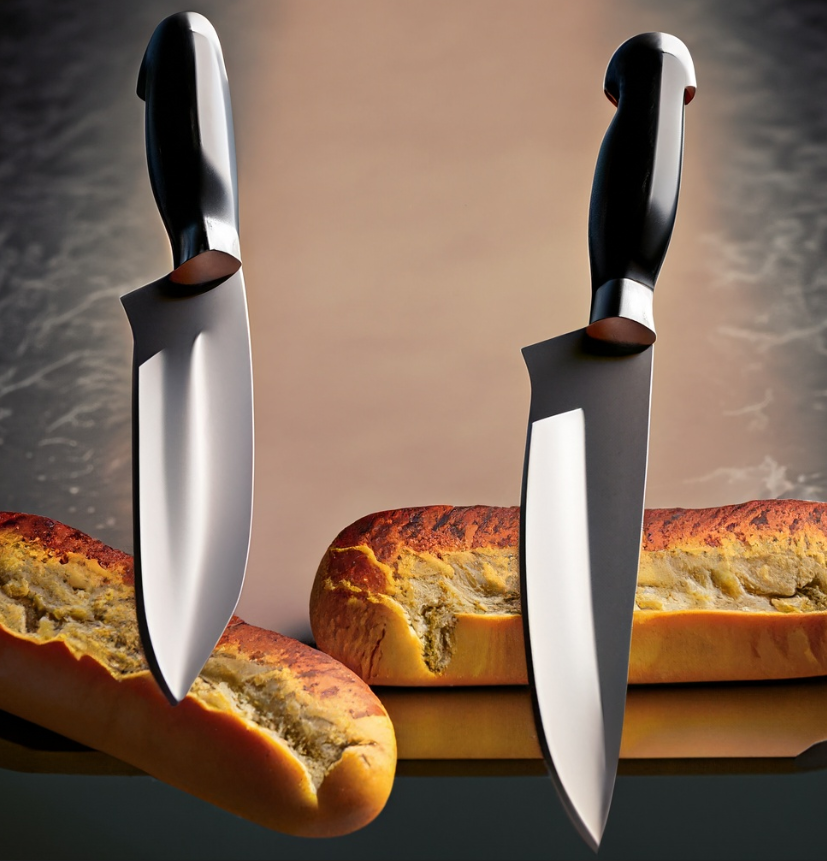
Why is it important to have sharp knives.
Share
Why You Need Sharp Knives in Your Kitchen
Knives are one of the most essential tools in any kitchen. Whether you are slicing bread, chopping vegetables, carving meat, or peeling fruit, you need a good knife that can handle the task. But not just any knife will do. You need a sharp knife that can cut through your food with ease and precision.
But why is having sharp knives so important? What are the benefits of sharpening your knives regularly? And how can you keep your knives sharp and well-maintained? Here are some answers to these questions.
The Benefits of Sharp Knives
There are many benefits of having sharp knives in your kitchen, such as:
• Safety: A sharp knife is a safe knife. This may sound counterintuitive, but it's true. A sharp knife requires less force and pressure to cut through food, which reduces the risk of slipping and injuring yourself. A dull knife, on the other hand, is more likely to slide off the food and cut your fingers or hands instead. A dull knife can also cause more damage if it does cut you, because it tears rather than slices the skin.
• Efficiency: A sharp knife is an efficient knife. It can cut through food faster and easier, saving you time and energy. A dull knife can slow you down and frustrate you, making cooking a chore rather than a pleasure. A dull knife can also waste food, because it can crush or bruise delicate ingredients like herbs, tomatoes, or mushrooms, affecting their appearance and flavor.
• Quality: A sharp knife is a quality knife. It can make precise and clean cuts that enhance the presentation and texture of your food. A dull knife can make rough and uneven cuts that affect the appearance and consistency of your food. For example, a sharp knife can slice meat thinly and smoothly, while a dull knife can shred or tear meat apart. A sharp knife can also preserve the nutrients and juices of your food, while a dull knife can expose more surface area and cause oxidation and loss of moisture.
How to Sharpen Your Knives
There are different ways to sharpen your knives, depending on your preference and budget. Some of the most common methods are:
• Manual knife sharpener: This is a simple and inexpensive device that has two slots with abrasive materials that grind and polish your knife blade. You just need to pull your knife through the coarse slot first and then the fine slot to sharpen and hone your knife edge.
• Electric knife sharpener: This is a more powerful and precise device that has spinning wheels with abrasive materials that grind and polish your knife blade. You just need to insert your knife into the designated slots and let the machine do the work for you.
• Whetstone: This is a traditional and versatile tool that has a rectangular block with a coarse grit side and a fine grit side. You need to wet the stone with water or oil and then rub your knife blade against it at an angle to sharpen and hone your knife edge.
How to Maintain Your Knives
Sharpening your knives is not enough to keep them in good condition. You also need to maintain them properly by following these tips:
• Clean your knives after each use: Wash your knives by hand with warm water and mild soap, and then dry them thoroughly with a soft cloth. Do not leave your knives soaking in water or put them in the dishwasher, as this can cause rusting or dulling of the blade.
• Store your knives safely: Keep your knives in a knife block, a magnetic strip, or a protective sheath when not in use. Do not toss your knives in a drawer or a cabinet, as this can damage the blade or cause accidents.
• Hone your knives regularly: Honing is different from sharpening. Honing is the process of realigning the edge of your knife blade with a honing rod or steel. Honing helps to keep your knife edge straight and smooth, preventing it from becoming dull or bent over time. You should hone your knives before each use or at least once a week.
Having sharp knives in your kitchen is not only beneficial but also enjoyable. Sharp knives can make cooking easier, faster, safer, and more fun. So don't neglect your knives. Sharpen them regularly and maintain them properly, and they will serve you well for years to come.
Tom Fasola 7732329316
